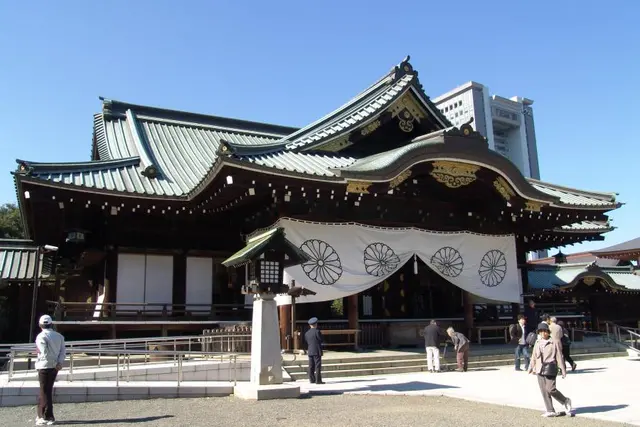Japanese Prime Minister Shinzo Abe along with some notable senior politicians on Thursday made ritual offerings to the notorious war-linked Yasukuni Shrine in Tokyo.
According to the shrine's representatives, the Japanese leader dedicated a "masakaki" tree to the notorious shrine as it begins to celebrate its spring festival.
Other senior government personnel including Labor and Welfare Minister Yasuhisa Shiozaki, House of Representatives Speaker Tadamori Oshima and House of Councillors President Masaaki Yamazaki made similar offerings.
Seiichi Eto, Abe's special advisor, however, visited the contentious war-linked shrine in person.
While Abe himself opted to abstain from visiting the ill-famed shrine in person and made the ritual offering in a private way, such gestures wether in person or made by proxy draw the ire of Japan's neighboring countries, particularly China and South Korea, who both suffered at the hands of Japan's brutal militarism before and during World War II.
The controversial war shrine honors the souls of some 2.5 million war dead, including more than 1,000 war criminals convicted by a post WWII court, including 14 Class-A war criminals as adjudicated by the war crimes tribunal.
Visits to Yasukuni Shrine by Japanese politicians and dignitaries are a continuous, yet avoidable flashpoint in relations between Japan and its neighbors, as the controversial shrine stands as a religious shrine devoted to propagate the supremacy of the Shinto faith, the holiness of Japan's Emperor and to espouse the glory of Japan's militarism both past and present.
For the victim countries of Japan's wartime atrocities, the shrine is a living reminder of the horrors inflicted by the Japanese Imperial Army during its time occupying countries, particularly in East Asia, and a symbol of ultra-right wing defiance and a stronghold of contemporary historical revisionism, militarism and an imperialistic mentality.
Visits or offerings made to the war-criminal honoring shrine by known right wing revisionists such as Abe, do little to help repair the diplomatic ties damaged by Japan over its misperception of history and ongoing territorial disputes with its neighbors.
Ritual offerings giving by a proxy are still considered a tacit blessing given to the 14 souls who are enshrined at Yasukuni and were found guilty of committing Class-A war crimes, whether or not the benefactor fully realizes or admits this or not.
The prime minister's previous attempts to draw similarities with United States' dignitaries paying homage at the Arlington National Cemetery in Virginia, has drawn criticism from U.S. officials and leading historians and, as such, visiting dignitaries to Japan overtly boycott Yasukuni and visit the internationally-recognized Chidorigafuchi National Cemetery - located just minutes from Yasukuni - to pay their respects to both Japanese and American lives lost during the war.
Yasukuni Shrine is run by a highly-secretive, private foundation and the 14 Class-A war criminals' "souls" were enshrined there without the public's knowledge in 1978, by the clandestine foundation, and nowadays the shrine's Yushukan museum openly depicts the war criminals as martyrs and misrepresents Japan's war in China as an act of "suppression" rather than one of aggression.
The museum itself has numerous displays depicting Japan's war-time endeavors, but has blatantly misrepresented the actual facts, in not referring to the well-documented Nanjing Massacre, chemical and other heinous experiments conducted on prisoners of war and the suffering of thousands of comfort women at the hands of the Japanese Imperial Army.
Former Emperor Hirohito stopped visiting the shrine in 1978 because of the enshrinement of war criminals there and Japan's current emperor Akihito has continued the imperial family's moratorium on visits to the shrine, which he understands is a loosely veiled site of overt nationalistic propaganda, that glorifies Japan's militaristic past.
Abe himself has not visited the shrine since he paid an ill-advised tribute there in person in December 2013, the fallout of which saw Japan's ties with its closest neighbors effectively disintegrate and the Japanese leader strongly reprimanded by the United States for inflaming regional tensions.
 简体中文
简体中文

